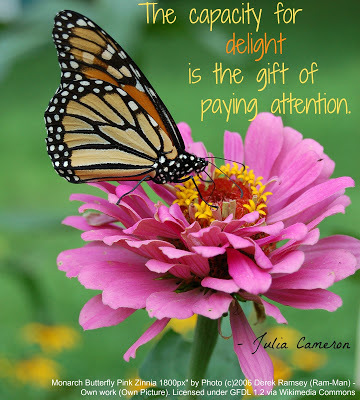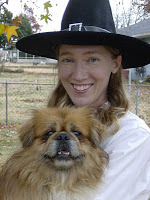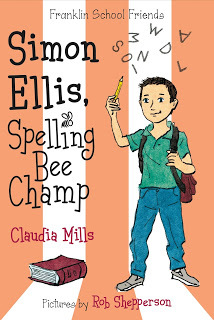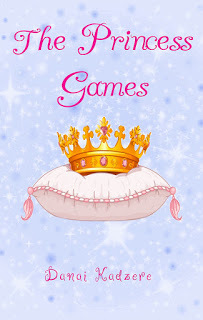Marcia Thornton Jones's Blog, page 160
December 5, 2015
The Gift of Writing by Deborah Lytton - December Theme
When I was a young girl and fell in love with reading, I never dared to dream of becoming a writer. I idolized authors like Judy Blume and Madeleine L'Engle and envisioned them writing in seashell covered castles with golden pens that never ran dry.

 When I began writing (with screenplays and short stories before finally arriving home with my great love, middle grade fiction), I found that it fulfilled something in me that had been missing. Writing is a gift I give to myself. It costs nothing and yet is more precious than anything money can buy. Writing is creativity, inspiration, freedom and hope woven together by words. It is a gift that is timeless.
When I began writing (with screenplays and short stories before finally arriving home with my great love, middle grade fiction), I found that it fulfilled something in me that had been missing. Writing is a gift I give to myself. It costs nothing and yet is more precious than anything money can buy. Writing is creativity, inspiration, freedom and hope woven together by words. It is a gift that is timeless.
We all have stories to tell and dreams to share in words, so this holiday season, give yourself the gift of writing. Promise to cherish it forever.
And if you ever forget how precious writing is, just imagine Judy Blume and Madeleine L'Engle with their pens of gold and how they wrote stories that will last forever in our hearts.

 When I began writing (with screenplays and short stories before finally arriving home with my great love, middle grade fiction), I found that it fulfilled something in me that had been missing. Writing is a gift I give to myself. It costs nothing and yet is more precious than anything money can buy. Writing is creativity, inspiration, freedom and hope woven together by words. It is a gift that is timeless.
When I began writing (with screenplays and short stories before finally arriving home with my great love, middle grade fiction), I found that it fulfilled something in me that had been missing. Writing is a gift I give to myself. It costs nothing and yet is more precious than anything money can buy. Writing is creativity, inspiration, freedom and hope woven together by words. It is a gift that is timeless.We all have stories to tell and dreams to share in words, so this holiday season, give yourself the gift of writing. Promise to cherish it forever.
And if you ever forget how precious writing is, just imagine Judy Blume and Madeleine L'Engle with their pens of gold and how they wrote stories that will last forever in our hearts.
Published on December 05, 2015 12:58
December 3, 2015
On Delight and the Gift of Paying Attention
Now that we are into the hectic holidays with all those lists of shoulds and wants, it's especially important to remind ourselves to s l o w d o w n:
put the phone away, turn off the TV, take a Twitter vacation.
When someone is talking to you, look them in the eyes and really, really listen.
What a gift that is! Not only to the other person, but to ourselves.
We only get this one precious life -- let's live it, each and every moment, shall we?
And you know, as writers, it's this kind of focused attention that fuels our best work.
It's from paying attention that great ideas are born.
It's from paying attention that we make the good bit of writing sing right off the page.
It's from paying attention that we learn how our writing practice can bring meaning to our lives, and to our readers' lives.
So, this holiday season, no matter where you are in your writing life, go out there (or stay inside!) and pay attention. That's where the delight is!
 Irene Latham is a poet and novelist from Birmingham, Alabama. Her books for children include Leaving Gee's Bend, Don't Feed the Boy, Dear Wandering Wildebeest, and two new poetry collections When the Sun Shines On Antarctica and Fresh Delicious: Poems from the Farmers' Market will be released in 2016. She's working on paying better attention and finding delight in her writing every day. irenelatham.com
Irene Latham is a poet and novelist from Birmingham, Alabama. Her books for children include Leaving Gee's Bend, Don't Feed the Boy, Dear Wandering Wildebeest, and two new poetry collections When the Sun Shines On Antarctica and Fresh Delicious: Poems from the Farmers' Market will be released in 2016. She's working on paying better attention and finding delight in her writing every day. irenelatham.com
put the phone away, turn off the TV, take a Twitter vacation.
When someone is talking to you, look them in the eyes and really, really listen.
What a gift that is! Not only to the other person, but to ourselves.
We only get this one precious life -- let's live it, each and every moment, shall we?
And you know, as writers, it's this kind of focused attention that fuels our best work.
It's from paying attention that great ideas are born.
It's from paying attention that we make the good bit of writing sing right off the page.
It's from paying attention that we learn how our writing practice can bring meaning to our lives, and to our readers' lives.
So, this holiday season, no matter where you are in your writing life, go out there (or stay inside!) and pay attention. That's where the delight is!
 Irene Latham is a poet and novelist from Birmingham, Alabama. Her books for children include Leaving Gee's Bend, Don't Feed the Boy, Dear Wandering Wildebeest, and two new poetry collections When the Sun Shines On Antarctica and Fresh Delicious: Poems from the Farmers' Market will be released in 2016. She's working on paying better attention and finding delight in her writing every day. irenelatham.com
Irene Latham is a poet and novelist from Birmingham, Alabama. Her books for children include Leaving Gee's Bend, Don't Feed the Boy, Dear Wandering Wildebeest, and two new poetry collections When the Sun Shines On Antarctica and Fresh Delicious: Poems from the Farmers' Market will be released in 2016. She's working on paying better attention and finding delight in her writing every day. irenelatham.com
Published on December 03, 2015 03:30
December 2, 2015
Go Ahead . . . Everybody's Doing It by Ann Haywood Leal

It’s not that bad, right? Some people just want to do it and get it over with. Some look forward to it eagerly. Adding details to our writing is like decorating for the holidays. Once you immerse yourself into it, you are hooked – and so will be your readers.
C.S. Lewis said, “Don’t say it was ‘delightful’; make us say ‘delightful’ when we ‘ve read the description. You see, all those words (horrifying, wonderful, hideous, exquisite) are only like saying to your readers, “Please will you do my job for me.”
 If you add the right detail, just a tiny word or two, you can make the reader laugh, or cry, or catch their breath.
If you add the right detail, just a tiny word or two, you can make the reader laugh, or cry, or catch their breath.Finding those perfect details isn’t as hard as it sounds. Try to notice the little things around you. What is that man doing in the car next to you? Is he texting? Is he weeping? Is he picking his nose?
When you add details to your story, it becomes personal. It goes from being any old story to being personal. That’s when it becomes real.
Maybe you are writing about the lady next door taking her garbage out in the morning. Get nosey with those characters. Ask yourself those impolite questions. What’s in that garbage and why does she have to take it out every morning? What’s that stain on her robe? Are her curtains open or closed, and how come she keeps her curtains closed in the daytime?
Try to notice those little details—I call it thinking like a poet. My favorite poets use very spare language to make the story come to life in the poem. They make every word count. They pay attention to subtle things, like the way someone’s voice goes up or down a little when they say certain things. Or the way their voice catches.
Don’t be afraid to channel Gladys Kravitz. Spy on those people in their stories. What’s out front of the house? Why are all those cars in the driveway all of a sudden? What’s going on over there?Is there a death? A birth? The cars are coming and going at all hours of the night. Are they drug dealers?
Don’t be satisfied with just steps. Make them creak.
Don’t be satisfied with just a classroom. Jazz it up. Put some contraband in there. Make someone throw up or want to throw up. Details can be deceptive, too. They can trick us—they can trick the reader. You can drop a tiny detail in and see if the reader notices—a bit of foreshadowing.
 I leave you with some holiday cheer from Mark Twain: “The difference between the right word and the almost right word is the difference between lightning and lightning-bug.”
I leave you with some holiday cheer from Mark Twain: “The difference between the right word and the almost right word is the difference between lightning and lightning-bug.”Now get back to your decorating!
Published on December 02, 2015 03:28
November 29, 2015
A RECIPE TO AVOID DISASTER, MAYBE by Tracy Holczer
I should start off by saying that I've come to believe a story is a living, breathing thing. That in some magical way I don't understand (and hopefully never will), it exists separate from me. To be honest, when I'm writing true, when the words flow from their bottomless place, untethered, it scares the crap out of me. In that tummy-drop roller coaster sort of way. Because it feels as though I've connected with, or scooted too close to, something ginormous and if I make a wrong turn, it just might eat me up.

With that in mind, I just typed "The End" last night on book number two. The real book number two. What started three years ago as a Vietnam era story about a girl and the aftermath of her Dad coming home changed from the war, has turned into a contemporary novel in verse about a girl dealing with an accident that has put her father in a wheelchair. Her larger than life, dancing in the supermarket aisles, smooching on her mom, father.
The first version never worked and I didn't know why. Both deal with fathers who are less than they were, and daughters who feel overly responsible. The answer came when I broke the news to my agent that the latest draft was coming in verse. She said, "Just don't manufacture anything."
Up until that point, I realized, that's all I'd been doing. Not a single piece of that first story came freely. I had to yank and pull and scream and rip out my hair. I wasn't listening for the story. I wasn't getting still and asking all the right questions. I wasn't writing true.
I really don't want to do this again.
I'm certain I will do this again.
So here is a recipe of sorts. Things to consider along with me when in this very particular place:
1. Listen.
2. Be passionate about the subject or set it aside.
3. Be scared, if that's how you feel, but only if you use it as fuel.
4. Story doesn't come from the intellect, so don't look for it there.
5. There is no shame in giving up. Not every idea is The One.
Please add to my list in the comments section. We're all in this together!

With that in mind, I just typed "The End" last night on book number two. The real book number two. What started three years ago as a Vietnam era story about a girl and the aftermath of her Dad coming home changed from the war, has turned into a contemporary novel in verse about a girl dealing with an accident that has put her father in a wheelchair. Her larger than life, dancing in the supermarket aisles, smooching on her mom, father.
The first version never worked and I didn't know why. Both deal with fathers who are less than they were, and daughters who feel overly responsible. The answer came when I broke the news to my agent that the latest draft was coming in verse. She said, "Just don't manufacture anything."
Up until that point, I realized, that's all I'd been doing. Not a single piece of that first story came freely. I had to yank and pull and scream and rip out my hair. I wasn't listening for the story. I wasn't getting still and asking all the right questions. I wasn't writing true.
I really don't want to do this again.
I'm certain I will do this again.
So here is a recipe of sorts. Things to consider along with me when in this very particular place:
1. Listen.
2. Be passionate about the subject or set it aside.
3. Be scared, if that's how you feel, but only if you use it as fuel.
4. Story doesn't come from the intellect, so don't look for it there.
5. There is no shame in giving up. Not every idea is The One.
Please add to my list in the comments section. We're all in this together!
Published on November 29, 2015 22:00
November 25, 2015
HAPPY THANKSGIVING - HOLLY SCHINDLER
A conversation Mom and I had last spring:
Me: "Why's this measuring cup gray inside?"
Mom: "Oh, yeah. I used it to spread grass seed."
Which pretty much sums up the way Schindler women feel about baking. Or cooking in general. We're not exactly domestic, frankly. I mean, folding's a word you could use to describe the process of putting clean clothes in our drawers. Cramming's another--and far more accurate.
But that doesn't mean we don't do it up for Thanksgiving, celebrating our gloriously non-domestic selves over a store-bought pie...
Here's to celebrating the perfectly imperfect people in your life...in your own way.
Happy Thanksgiving!
 Me & Jake givin' thanks...
Me & Jake givin' thanks...
Me: "Why's this measuring cup gray inside?"
Mom: "Oh, yeah. I used it to spread grass seed."
Which pretty much sums up the way Schindler women feel about baking. Or cooking in general. We're not exactly domestic, frankly. I mean, folding's a word you could use to describe the process of putting clean clothes in our drawers. Cramming's another--and far more accurate.
But that doesn't mean we don't do it up for Thanksgiving, celebrating our gloriously non-domestic selves over a store-bought pie...
Here's to celebrating the perfectly imperfect people in your life...in your own way.
Happy Thanksgiving!
 Me & Jake givin' thanks...
Me & Jake givin' thanks...
Published on November 25, 2015 05:00
November 22, 2015
Grateful for Books: Smack Dab in the classroom by Dia Calhoun
Thanksgiving smacks of gratitude. Or do we smack our lips with gratitude? Either way, this is a good time to ask kids gratitude questions about books,
What book are you most grateful to have read since school started? WhyWhat book are you most grateful to have read in your entire life? Why?What character are you most grateful to have met (in your imagination). Why?What place in a book are you most grateful to have been (in your imagination). Why?Here are my answers.Ego and Archetype by Edward Edinger. Because it expanded my understanding of the immense role the unconscious plays in our lives.The Hundred Dresses by Eleanor Estes. I first read it in grade still and I still read it every year. It taught me about richness of imagination, narrowness of prejudice, and largeness of heart.Jo March. Because of her passion for writing and climbing trees in a time when ladies didn't do such things.Middle Earth. Because it is the whole wild world.Happy Books and Happy Thanksgiving!
What book are you most grateful to have read since school started? WhyWhat book are you most grateful to have read in your entire life? Why?What character are you most grateful to have met (in your imagination). Why?What place in a book are you most grateful to have been (in your imagination). Why?Here are my answers.Ego and Archetype by Edward Edinger. Because it expanded my understanding of the immense role the unconscious plays in our lives.The Hundred Dresses by Eleanor Estes. I first read it in grade still and I still read it every year. It taught me about richness of imagination, narrowness of prejudice, and largeness of heart.Jo March. Because of her passion for writing and climbing trees in a time when ladies didn't do such things.Middle Earth. Because it is the whole wild world.Happy Books and Happy Thanksgiving!
Published on November 22, 2015 22:00
Critique Group Turkeys by Laurie Calkhoven
Critique groups are formed because writers want support and validation and because we want to make our work the best it can be. When I first started taking formal writing workshops, the rule in most was that the writer was not allowed speak when being critiqued. At the end we were asked to sum up what the group said, and had an opportunity to ask questions.
It can be hard to receive the most constructive of criticism. We want to jump in to explain (that’s not what I meant!) or defend (of course my character would wear a pink tutu!) or tell the other person that she’s wrong, wrong, wrong! Being silent gives us no other choice but to listen. In the end we can disagree, but first we have to listen.
My own, much less formal, critique group evolved in a more loosey goosey manner. Writers do talk during their critiques—to answer and ask questions, to explain why we made a certain choice, etc.
I thought that loosey goosey format was working for us until we got a new member. He never stopped talking. He spent all his time defending, arguing, and explaining. When we questioned a character’s motivation, he said we were wrong. When we made a suggestion for improving something or other, he was ready with reasons why he couldn’t. He spent a lot of time explaining what he was setting up or what was coming next. It didn’t matter how many times one of us pointed out that that he couldn’t sit on every readers shoulder to explain, that if it wasn’t on the page it didn’t matter. He persisted.
A lot of the same issues came up session after session. I realized that he wasn’t listening. He was too busy defending and explaining to listen. And then I realized that he didn’t want a critique group. He wanted an audience. He was the dreaded critique group turkey.
Since then, I’ve closely monitored my own behavior to make sure I’m not doing the same thing. I keep my mouth shut, I listen, and only then—after all the talking is over—do I ask questions.
It’s hard, but it’s important. Don’t be a turkey!
It can be hard to receive the most constructive of criticism. We want to jump in to explain (that’s not what I meant!) or defend (of course my character would wear a pink tutu!) or tell the other person that she’s wrong, wrong, wrong! Being silent gives us no other choice but to listen. In the end we can disagree, but first we have to listen.
My own, much less formal, critique group evolved in a more loosey goosey manner. Writers do talk during their critiques—to answer and ask questions, to explain why we made a certain choice, etc.
I thought that loosey goosey format was working for us until we got a new member. He never stopped talking. He spent all his time defending, arguing, and explaining. When we questioned a character’s motivation, he said we were wrong. When we made a suggestion for improving something or other, he was ready with reasons why he couldn’t. He spent a lot of time explaining what he was setting up or what was coming next. It didn’t matter how many times one of us pointed out that that he couldn’t sit on every readers shoulder to explain, that if it wasn’t on the page it didn’t matter. He persisted.
A lot of the same issues came up session after session. I realized that he wasn’t listening. He was too busy defending and explaining to listen. And then I realized that he didn’t want a critique group. He wanted an audience. He was the dreaded critique group turkey.
Since then, I’ve closely monitored my own behavior to make sure I’m not doing the same thing. I keep my mouth shut, I listen, and only then—after all the talking is over—do I ask questions.
It’s hard, but it’s important. Don’t be a turkey!
Published on November 22, 2015 02:13
November 18, 2015
Recipe for Honey Pie (November theme) by Claudia Mills
My most recent book is the fourth title in my Franklin School Friends chapter book series, titled Simon Ellis, Spelling Bee Champ.
 Part of the fun in writing the series, for me, is finding some way for exuberant, ebullient principal Mr. Boone (to use two of Simon's favorite spelling words) to throw his always abundant enthusiasm behind the central activity of each book. Here Mr. Boone comes "buzzing" into each classroom to generate enthusiasm for the grade-wide spelling bee, offering as a prize for the winning team a chance to attend a pie buffet starring his famous honey pie.
Part of the fun in writing the series, for me, is finding some way for exuberant, ebullient principal Mr. Boone (to use two of Simon's favorite spelling words) to throw his always abundant enthusiasm behind the central activity of each book. Here Mr. Boone comes "buzzing" into each classroom to generate enthusiasm for the grade-wide spelling bee, offering as a prize for the winning team a chance to attend a pie buffet starring his famous honey pie.
My editor read the book and said, "We should definitely include the recipe for honey pie."
"Yes!" I said. And then remembered one small problem. I didn't have a recipe for honey pie. I had no idea if honey pie even existed.
So add to the many uses of social media for writers: putting out a Facebook call for honey pie recipes. Within an hour I had several replies, including one from brilliant middle-grade author Lisa Graff, whose delightful National-Book-Award-long-list title A Tangle of Knots is filled with mouth-watering cake recipes. I took Lisa's recipe, added a tweak or two of my own to simplify, and another editor at my publisher did one last tweaking. The book now has a recipe for Mr. Boone's famous honey pie.
We've had snow here in Colorado this week. Maybe I should bake a honey pie this afternoon and cut myself a nice warm slice to enjoy with a cup of tea and gratitude for Facebook and the generosity of fellow authors who not only know how to write wonderful books but know how to bake wonderful pies as well.
 Part of the fun in writing the series, for me, is finding some way for exuberant, ebullient principal Mr. Boone (to use two of Simon's favorite spelling words) to throw his always abundant enthusiasm behind the central activity of each book. Here Mr. Boone comes "buzzing" into each classroom to generate enthusiasm for the grade-wide spelling bee, offering as a prize for the winning team a chance to attend a pie buffet starring his famous honey pie.
Part of the fun in writing the series, for me, is finding some way for exuberant, ebullient principal Mr. Boone (to use two of Simon's favorite spelling words) to throw his always abundant enthusiasm behind the central activity of each book. Here Mr. Boone comes "buzzing" into each classroom to generate enthusiasm for the grade-wide spelling bee, offering as a prize for the winning team a chance to attend a pie buffet starring his famous honey pie.My editor read the book and said, "We should definitely include the recipe for honey pie."
"Yes!" I said. And then remembered one small problem. I didn't have a recipe for honey pie. I had no idea if honey pie even existed.
So add to the many uses of social media for writers: putting out a Facebook call for honey pie recipes. Within an hour I had several replies, including one from brilliant middle-grade author Lisa Graff, whose delightful National-Book-Award-long-list title A Tangle of Knots is filled with mouth-watering cake recipes. I took Lisa's recipe, added a tweak or two of my own to simplify, and another editor at my publisher did one last tweaking. The book now has a recipe for Mr. Boone's famous honey pie.
We've had snow here in Colorado this week. Maybe I should bake a honey pie this afternoon and cut myself a nice warm slice to enjoy with a cup of tea and gratitude for Facebook and the generosity of fellow authors who not only know how to write wonderful books but know how to bake wonderful pies as well.
Published on November 18, 2015 09:46
November 17, 2015
Recipe for a NaNoWriMo Novel (November Theme, Sarah Dooley)
Hello! It's November, and what does that mean? It's National Novel Writing Month!
If you aren't familiar with this project, the idea is that people all over the world take time out of their daily lives to sweat, cry, procrastinate, tear up pages, hide under desks, guzzle coffee, and ultimately churn out a 50,000-word novel between November 1 and November 30. Although I'm a novelist year-round, there is just something about November -- the energy! The camaraderie! The typos! -- that brings me back for NaNoWriMo year after year.
It works for me -- after all, Livvie Owen Lived Here and Body of Water were both NaNoWriMo novels. So, since we're talking about recipes this month, I've taken a moment to pin down just what it is that goes into a fully-baked NaNoWriMo novel.
RECIPE FOR A NANOWRIMO NOVEL
You will need:
-An empty notebook, blank computer file, or some other method of recording words
-A functional coffee pot and a supply of coffee that would last you at least 60 non-November days
-A character (generic is fine)
-50,000 words
Optional:
-A plot (some swear by this; others find that it is not necessary to the baking process)
-A little dialogue (for flavor)
-Some punctuation (can be added after novel comes out of the oven)
Process:
1. Open notebook/computer file.
2. Don't panic.
3. Separate words into 1,667-word chunks. Set aside.
4. Slowly sift character, coffee, plot, and punctuation onto the page using one of your 1,667-word chunks.
5. Repeat daily for 30 days.
6. If you are still following this recipe, you are a rock star. If you deviated at step 4, you can still salvage this thing.
7. Recalculate your word-batches and continue to sift with coffee and tears.
8. Stir furiously with nonsensical plot twists from the Internet community.
9. If you pray, this would not be a bad time. Also, buy more coffee.
10. Search and replace main character's name, Mary, with Mary Beth, which ups your word count by 67 words. Do the same for each character. Refer to all characters by full names and titles.
11. Name all your chapters.
12. Now give all your chapters alternate names. Then recalculate the daily batches of words still needed to reach your goal.
13. Coffee.
14. Continue to sift character, plot, unnecessary descriptive passages, coffee, and energy drinks onto the page until --
15. The novel begins to set.
16. Keep going.
17. Let the novel take over.
18. See where it takes you.
19. This! This is somewhere you didn't know you were going to end up!
20. Bake until November 30.
21. Go to sleep.
And now, a recipe for the only food you'll have time to eat if you're writing the above novel:
RECIPE FOR NANOWRIMO FOOD
1. Place bread in the toaster.
2. Forget you have a toaster.
3. Wait three hours.
4. Gnaw on cold crusts.
5. Order pizza.
Happy noveling!
If you aren't familiar with this project, the idea is that people all over the world take time out of their daily lives to sweat, cry, procrastinate, tear up pages, hide under desks, guzzle coffee, and ultimately churn out a 50,000-word novel between November 1 and November 30. Although I'm a novelist year-round, there is just something about November -- the energy! The camaraderie! The typos! -- that brings me back for NaNoWriMo year after year.
It works for me -- after all, Livvie Owen Lived Here and Body of Water were both NaNoWriMo novels. So, since we're talking about recipes this month, I've taken a moment to pin down just what it is that goes into a fully-baked NaNoWriMo novel.
RECIPE FOR A NANOWRIMO NOVEL
You will need:
-An empty notebook, blank computer file, or some other method of recording words
-A functional coffee pot and a supply of coffee that would last you at least 60 non-November days
-A character (generic is fine)
-50,000 words
Optional:
-A plot (some swear by this; others find that it is not necessary to the baking process)
-A little dialogue (for flavor)
-Some punctuation (can be added after novel comes out of the oven)
Process:
1. Open notebook/computer file.
2. Don't panic.
3. Separate words into 1,667-word chunks. Set aside.
4. Slowly sift character, coffee, plot, and punctuation onto the page using one of your 1,667-word chunks.
5. Repeat daily for 30 days.
6. If you are still following this recipe, you are a rock star. If you deviated at step 4, you can still salvage this thing.
7. Recalculate your word-batches and continue to sift with coffee and tears.
8. Stir furiously with nonsensical plot twists from the Internet community.
9. If you pray, this would not be a bad time. Also, buy more coffee.
10. Search and replace main character's name, Mary, with Mary Beth, which ups your word count by 67 words. Do the same for each character. Refer to all characters by full names and titles.
11. Name all your chapters.
12. Now give all your chapters alternate names. Then recalculate the daily batches of words still needed to reach your goal.
13. Coffee.
14. Continue to sift character, plot, unnecessary descriptive passages, coffee, and energy drinks onto the page until --
15. The novel begins to set.
16. Keep going.
17. Let the novel take over.
18. See where it takes you.
19. This! This is somewhere you didn't know you were going to end up!
20. Bake until November 30.
21. Go to sleep.
And now, a recipe for the only food you'll have time to eat if you're writing the above novel:
RECIPE FOR NANOWRIMO FOOD
1. Place bread in the toaster.
2. Forget you have a toaster.
3. Wait three hours.
4. Gnaw on cold crusts.
5. Order pizza.
Happy noveling!
Published on November 17, 2015 14:59
November 16, 2015
INTERVIEW + GIVEAWAY: DANAI KADZERE, AUTHOR OF THE PRINCESS GAMES
 Today, we're joined by Danai Kadzere, author of THE PRINCESS GAMES--a fun read that can also lend itself to some important discussions with your young reader regarding femininity and what it means to be a girl today, as revealed by our recent discussion:
Today, we're joined by Danai Kadzere, author of THE PRINCESS GAMES--a fun read that can also lend itself to some important discussions with your young reader regarding femininity and what it means to be a girl today, as revealed by our recent discussion:Tell us about the inspiration behind THE PRINCESS GAMES.
I am often inspired by my surroundings and the idea for ‘The Princess Games’ came to me when I was touring an old castle near my grandparents’ home in Niedersachsen, Germany! It was beautiful in a sleepy way and I was so excited to bring the castle’s world-that-could-be to life in the story!
There’s been much discussion lately about the “princessification” of little girls. (Especially in toy aisles, where formerly neutral toys—doctor’s kits, etc.—have been moved to the boy section.) Were you thinking of this at all when you drafted THE PRINCESS GAMES? How do you feel about the “princessification” issue?
I think it’s always important to teach girls that they can be and do more than be something nice to look at, especially in a time where popular culture has a strong idea of what a girl ‘should’ be and we see it in the media every day from young ages on and throughout our formative years. ‘The Princess Games’ isn’t there to lecture girls in any way, but I populated its world with different versions of girlhood, to reinforce the message that there’s no single correct way to be a girl.
 In the opening pages of the novel, Emma is quite clear that she doesn’t want to be a princess. Do you think it’s become a dirty word? How so?
In the opening pages of the novel, Emma is quite clear that she doesn’t want to be a princess. Do you think it’s become a dirty word? How so?I think in the same way as something being described as ‘girly’ tends to carry a very strong connotation of a certain type of femininity, ‘princess’ has some negative (or at least, strictly defined) connotations that many girls would want to distance themselves from, rightfully. I think that shouldn’t be the case – ‘princess’ and ‘queen’ should carry the same weight, power, and seriousness of ‘prince’ and ‘king’! Emma learns that in the book.
I also love the line regarding how “girls don’t participate in competitions.” It made me think of Obama’s recent definition of what it means to play like a girl. How did you approach definitions of femininity and strength / competitiveness as you drafted? Did you find that especially tricky when writing for a younger audience?
I grew up with sisters (one older and one younger), was a Girl Scout, and grew up with the ‘girls can do anything (at least) as well as boys can’ attitude, so it wasn’t particularly tricky to translate my experience of girlhood into something age appropriate. It was important to me to show both possibilities for competition among girls in ‘The Princess Games.’ There is both the destructive me-against-you competition and, later, the constructive challenging-each-other-to-be-better competition.
What can we expect to see from you next?
I’m working on a sequel to ‘The Princess Games,’ so keep an eye out!
GIVEAWAY ALERT:
Danai is giving three e-copies of THE PRINCESS GAMES! Fill out the form below to enter; the giveaway ends November 30.
a Rafflecopter giveaway
Published on November 16, 2015 05:00



